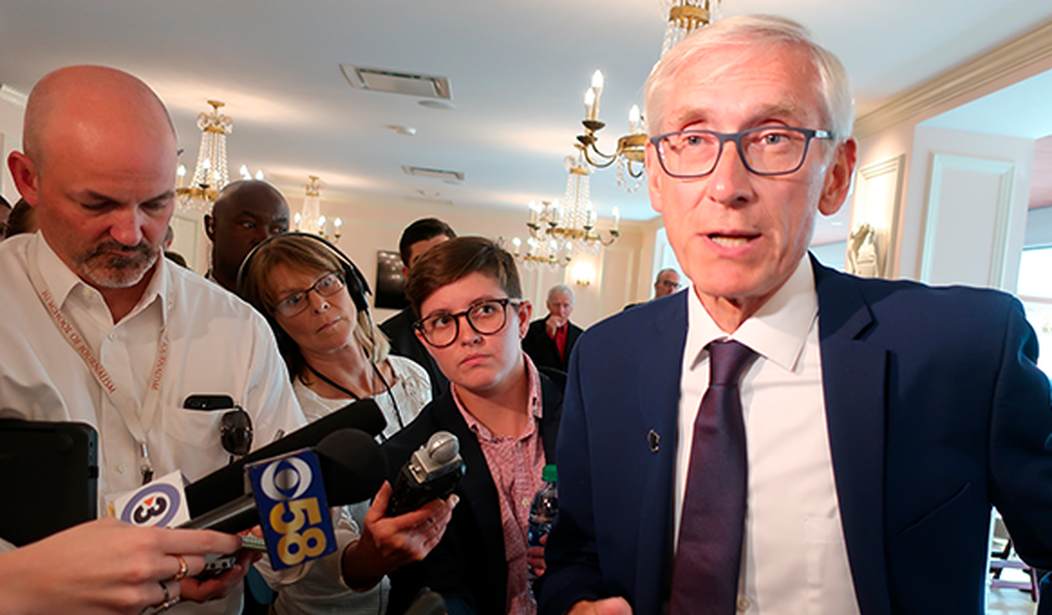On Wednesday, the Wisconsin Supreme Court struck down a stay-at-home order issued by Department of Health Services Secretary-designate Andrea Palm in order to slow the spread of the coronavirus. While the court did not challenge the Emergency Declaration issued by Gov. Tony Evers (D-Wisc.), it ruled that Palm violated state law by not following proper rulemaking procedures that allow the Republican-dominated legislature some say in the issuing of such orders.
According to the Milwaukee Journal-Sentinel, the ruling strips coronavirus regulations so that “bars, restaurants and concert halls are allowed to reopen — unless local officials put in their own restrictions.”
“The Wisconsin Supreme Court just NUKED the lockdowns,” Donald Trump Jr. tweeted.
The Wisconsin Supreme Court just NUKED the lockdowns #Wisconsin https://t.co/26cdz2v75J
— Donald Trump Jr. (@DonaldJTrumpJr) May 13, 2020
While the Journal-Sentinel claimed that the court “struck down Gov. Tony Evers’ order,” the very first line of the opinion, written by Chief Justice Patience Roggensack, contradicts this claim.
“This case is about the assertion of power by one unelected official, Andrea Palm, and her order to all people within Wisconsin to remain in their homes, not to travel and to close all businesses that she declares are not ‘essential’ in Emergency Order 28. Palm says that failure to obey Order 28 subjects the transgressor to imprisonment for 30 days, a $250 fine or both. This case is not about Governor Tony Evers’ Emergency Order or the powers of the Governor,” Roggensack argues.
According to the opinion, Palm “broke the law when she issued Emergency Order 28 after failing to follow emergency rule procedures,” and she “exceeded her authority by ordering everyone to stay home, closing all ‘non-essential’ businesses, prohibiting private gatherings of any number of people who are not part of a single household, and forbidding all ‘non-essential’ travel.”
Importantly, Roggensack adds, “We do not conclude that Palm was without any power to act in the face of this pandemic. However, Palm must follow the law that is applicable to state-wide emergencies.” By refusing to do so, she impinged upon the Legislature’s constitutional core power and its functions.” Under Palm’s interpretation, “an elected official could create law applicable to all people during the course of COVID-19 and subject people to imprisonment when they disobeyed her order.”
Republican lawmakers brought the suit in order to have a seat at the table when it comes to coronavirus restrictions.
Four of the Wisconsin Supreme Court’s five conservatives ruled against Palm: Roggensack and Justices Rebecca Bradley, Daniel Kelly, and Anette Ziegler. The fifth conservative, Brian Hagedorn, wrote a dissent joined by two liberals, Ann Walsh Bradley and Rebecca Dallet.
Hagedorn argued that Wisconsin state law allows the governor’s designate to have this authority. “The legislature may have buyer’s remorse for the breadth of discretion it gave to DHS in (state law). But those are the laws it drafted; we must read them faithfully whether we like them or not.” In 1981, amid the HIV and AIDS epidemic, the legislature gave DHS the power to issue orders.
Bradley slammed Hagedorn’s dissent, however, saying his argument “contains no constitutional analysis whatsoever, affirmatively rejects the constitution, and subjugates liberty.”
“Isn’t it the very definition of tyranny for one person to order people to be imprisoned for going to work among other ordinarily lawful activities?” Bradley asked.
The court’s ruling came after a few thousand people protested the coronavirus restrictions at rallies across the state. More than 500,000 Wisconsinites have filed for unemployment since the government forced businesses to close.
A Marquette University Law School poll found that 69 percent of voters believed restrictions were appropriate, down from 80 percent in March.
Wisconsin has had 10,611 confirmed coronavirus cases and 418 deaths.
The coronavirus pandemic is dangerous and deadly, but so are the mandatory lockdowns. Whether or not Palm truly exceeded her authority, many governors and local leaders have abused their power in this crisis. Gov. Evers and his administration should work with the legislature to find appropriate ways to stop the spread while crippling the state’s economy as little as possible.
Tyler O’Neil is the author of Making Hate Pay: The Corruption of the Southern Poverty Law Center. Follow him on Twitter at @Tyler2ONeil.
Editor’s Note: Want to support PJ Media so we can keep telling the truth about China and the virus they unleashed on the world? Join PJ Media VIP and use the promo code WUHAN to get 25% off your VIP membership.









Join the conversation as a VIP Member